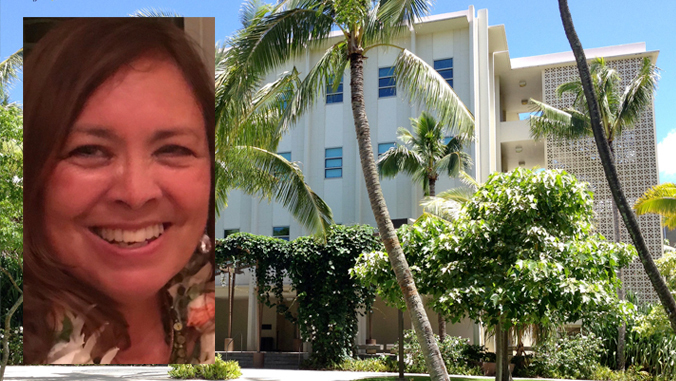
Nālani Minton, a faculty member of the University of Hawaiʻi at Mānoa Nancy Atmospera-Walch School of Nursing (NAWSON) has been awarded the Empowering ʻŌiwi Leadership Award (E OLA) by Kamehameha Schools and the Council for Native Hawaiian Advancement. The award recognizes emerging Native Hawaiian leaders across Hawaiʻi.
Minton is the founder and director of NAWSON’s nationally-recognized ʻIKE AO PONO program that was established in 2002 to increase the number of Native Hawaiian, Pacific Islander and Native American nurses in order to advance the healthcare and well-being of the people of Hawaiʻi and beyond. The program proudly supports the WASC accreditation standing for UH Mānoa as an Indigenous Serving University.
Under her leadership, the ʻIKE AO PONO program has reached the graduation of 505 Indigenous nurses, including 336 BS, 135 MS, 11 PhD and 23 DNP prepared nurses. The program received the American Association Colleges of Nursing national award for nursing education innovation and was recognized for having the most Native nurses graduating within the United States by the late U.S. Senator Daniel K. Inouye in 2010.
Minton, with a background in clinical psychology, is the first Native Hawaiian/Maoli ever hired and tenured at NAWSON. Her involvement with the university’s Native Hawaiian Health Initiative has led to eight Native Hawaiians in faculty positions at the school, including Donna Palakiko, PhD, a former ʻIKE AO PONO student, and first Native Hawaiian nurse hired in a NAWSON tenure-track position. She is presently fulfilling her Fulbright Scholarship in Australia. Hundreds of leaders in health and nursing professions that are making contributions in urban, rural, at-risk, underserved and marginalized communities are also graduates of the ʻIKE AO PONO program. Minton is a founding member of the Kūaliʻi and Pūkoʻa Councils who advocate for Native Hawaiian programs throughout the UH System.
“As the director of Native Hawaiian Social Justice Programs, I bring the advocacy and manaʻo of my life experiences as an activist in Indigenous rights to my work at the nursing school and am proud to be the first Native Hawaiian/Maoli ever hired or tenured as faculty at NAWSON in over 100 years,” said Minton, who has been involved with Native Hawaiian health and social justice initiatives for most of her life.
Collective collaboration
Minton’s focus as a Maoli clinical psychologist and cultural health practitioner is to amplify the recovery of Kanaka Maoli and others from intergenerational trauma and historical grief through higher education.
“These accomplishments are shared precedents through the collaborative efforts of the students, the faculty and administration at NAWSON, especially, Deans Dr. Mary Boland and Dr. Clem Ceria-Ulep, as well as UH President David Lassner and UH Mānoa Provost Michael Bruno, Dr. Punihei Lipe, director of Native Hawaiian Affairs, TRHT, The Native Hawaiian Place of Learning Initiatives, including the UHM Strategic Plan, Dr. Lilikala Kameʻeleihiwa, budget chair, and Kealiʻi Gora, director of Kūaliʻi and Pūkoʻa Councils, and other partners and funders who have provided collective support, especially the Queens Healthcare Systems, Dr. Jill Hoggard-Green, CEO, Dr. Kelly Johnson, CNO, Dr. Cindy Kamikawa, CEO, Dr. Noreen Mokuau, former dean of the School of Social Work and Public Health, Dr. Keawe Kaholokula, director of Department of Native Hawaiian Health, Dr. Maenette Benham, UH West Oʻahu chancellor, Dr. Diane Paloma, UH Board of Regents member, Dr. Naleen Andrade, also director of E Ola Mau a Mau, Dr. D.J. Mailer, former CEO of Kamehameha Schools, Dr. Jerris Hedges, dean of JABSOM, Papa Ola Lokahi, and other Native Hawaiian organizations,” said Minton.
“Nālani is a deeply committed proponent of Indigenous rights and has devoted her life to uplifting our Kanaka Maoli through her work,” said Diane Peters-Nguyen, CEO of the American Red Cross Pacific Islands Region, who nominated Minton for the award. “She has committed her life work to ending systemic, structural and operational racism through her work with the Tribunal, Kahoʻokolokolonui Kanaka Maoli in Hawaiʻi and at the UN Geneva International Indigenous Peoples Working Groups, where she was designated ʻelele pono by Dr. Kekuni Blaisdell, Tribunal Convenor, and contributed to the drafting of the Declaration on the Rights of Indigenous Peoples, which expanded self-determination under international law for all Indigenous Peoples worldwide.”
Peters-Nguyen added, “Nālani is an inspirational leader, educator and compassionate cultural practitioner to those she teaches and empowers, especially as a role model and mentor for future leaders and the next generations of our lahui. This is expressed in her life’s work in cultural education, health, healing, writing, music, art, film and her positive spirit.”
For more information on E OLA, visit the website.
This recognition is an example of UH Mānoa’s goal of Becoming a Native Hawaiian Place of Learning (PDF), one of four goals identified in the 2015–25 Strategic Plan (PDF), updated in December 2020.

